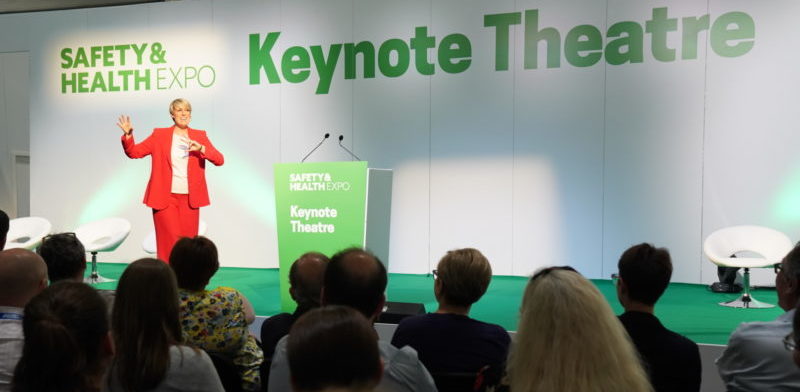The first ‘Inspirational Keynote’ session of this year’s Safety and Health Expo, and speaking as part of ‘Women in Health & Safety’, Steph McGovern is a household name to most of us via her career in journalism and appearances on a wide range of TV shows.

Whilst delivering an extremely interesting and highly entertaining insight into her career to date, Steph also made a number of key and inciteful points about what it takes to be a good business, and why, in the UK, we really need to place more value vocational training – not least to address the current skills gap crisis.
A passion for business
Steph began the session by explaining her passion for business, and shared the impressive statistic that she has visited around 800 business in the last seven – eight years. This has meant spending lots of time in a variety of PPE – safety helmets, safety boots etc., so much so that apparently someone has now devoted an entire website to ‘Steph in Safety Gear’!
During these visits, it’s usually health and safety teams that are Steph’s first point of contact, whilst she undergoes the mandatory risk assessments that are a feature of site visits: and she made a point of underlining the importance of these assessments by saying: “thanks to you guys for keeping me safe.”
Steph believes her passion for business was borne out of her Middlesbrough upbringing i.e. in an area where there was lots of industry. Also, her school was sponsored by British American Tobacco, which was an initiative to encourage connections with local industry: this provided opportunities to visit lots of different businesses, including construction and engineering.
These opportunities piqued Steph’s interest in engineering, and on leaving school she worked as an apprentice at Black + Decker in Durham, which later sponsored her degree. Her natural talent and enthusiasm helped her win the title ‘Young Engineer of Britain’.
Why TV?
After winning the title ‘Young Engineer of Britain’, Steph was invited to appear in a TV programme about ‘Women in Science and Industry’. Via her experiences on the programme, she realised there was a whole different world of work to explore, and so she made the move into journalism, reporting on business and finance for a number of TV and radio shows.
Reflecting on where the passion for business stemmed from, Steph explained that she learned more from the visits she made to businesses, than from her interviews with politicians: that these visits reflect the vast number of different jobs available in the UK; the incredible variety of businesses; and – not least – what we’re good at as a nation.
Important lessons learned
 Clocking up such a high number of visits to businesses all around the UK, meant that a number of significant realisations began to resonate with Steph:
Clocking up such a high number of visits to businesses all around the UK, meant that a number of significant realisations began to resonate with Steph:
- Everyone can make a contribution – whether you’re the head of a FTSE100 company, or a person on the shop floor: no one is better than anyone else;
- There is a huge skills shortage in the UK, which is mainly attributable to the education system’s focus on, and value of, academia – rather than vocational training;
- Technology should be a top consideration for businesses, no matter how small, large, young or old the business – in order to survive and also to attract new talent;
- Look at your business in a more relevant way – for example, by getting the team involved in a business improvement exercise such as ‘How would Amazon run our company?’
Sharing her view that the UK doesn’t sufficiently value, or focus on, vocational training – academia is more highly prized, and education focusses too much on five year olds passing tests, rather than being exposed to more vocational pursuits, Steph passionately believes that “Everyone learns in different ways”, and that it’s highly disappointing our society doesn’t make the non-academic young people feel good about themselves – moreover, that this can actually contribute to mental health issues. After all, there are many other, important life skills that children need to learn during their education: maybe if these skills were more highly valued then children might feel better placed to learn more and achieve more.
Steph also believes that not only are vocational training, and apprenticeships, extremely important and valuable, but moreover – they breed entrepreneurialism: which is of course, a mainstay of our economy.
Interestingly, this belief in the importance of vocational training is clearly illustrated by the following statistics from the City and Guilds Group:
- The Government has pledged to delivery 3 million apprenticeships by 2020;
- Apprenticeships can provide an economic return of £16 – £21 for every £1 invested by the Government;
- Apprenticeships and vocational training can increase earnings capacity by 20%, and employability by 14%;
- In the 10 years to 2025, the increase in vocational training could add £163 billion in GDP to the UK economy.
How a good business can weather the storm
 Consolidating her views on what it takes to be a good business, and – not least – how to weather the current, uncertain economic and political climate, Steph shared her belief that technology has to be the prime consideration for every business, saying “Embrace technology and how it can help your business – be part of the technical revolution!” She cited interesting and creative examples such as attracting new employees via YouTube videos, or vlogs – e.g. by featuring a film tour of your business; also other considerations such as how companies need to look at people – both young and old – who are re-skilling, and could therefore fill the skills gaps that exist in industry today.
Consolidating her views on what it takes to be a good business, and – not least – how to weather the current, uncertain economic and political climate, Steph shared her belief that technology has to be the prime consideration for every business, saying “Embrace technology and how it can help your business – be part of the technical revolution!” She cited interesting and creative examples such as attracting new employees via YouTube videos, or vlogs – e.g. by featuring a film tour of your business; also other considerations such as how companies need to look at people – both young and old – who are re-skilling, and could therefore fill the skills gaps that exist in industry today.
Steph summed up by saying that although things are tough for businesses in Britain today, and there is a huge skills gap – “You just need to carry on – business that are doing well don’t let uncertainty stop them. Be part of the technological revolution, value skills more highly, and growth will come from this.”
The importance of being yourself
The session ended by Steph reinforcing her belief that it’s ‘vital to just be yourself, and not the person you think other people want you to be’: borne out of her own experience of being a ‘girl’ from the North – Middlesbrough – then being transported to the world of TV where Northerners weren’t at that stage part of the team, and maintaining her personal integrity by being true to herself. Clearly, the results speak for themselves on this point. And it’s not surprising then, that when asked who her favourite interviewee was, she replied that it’s Michael O’Leary – precisely because he is exactly that – true to himself. He genuinely doesn’t care about saying ‘the right thing’ or saying what people want to hear, he simply tells the truth – because he believes in the decisions he’s made, and is true to himself.
Advance your career in health and safety
Browse hundreds of jobs in health and safety, brought to you by SHP4Jobs, and take your next steps as a consultant, health and safety officer, environmental advisor, health and wellbeing manager and more.
Or, if you’re a recruiter, post jobs and use our database to discover the most qualified candidates.


 Clocking up such a high number of visits to businesses all around the UK, meant that a number of significant realisations began to resonate with Steph:
Clocking up such a high number of visits to businesses all around the UK, meant that a number of significant realisations began to resonate with Steph: Consolidating her views on what it takes to be a good business, and – not least – how to weather the current, uncertain economic and political climate, Steph shared her belief that technology has to be the prime consideration for every business, saying “Embrace technology and how it can help your business – be part of the technical revolution!” She cited interesting and creative examples such as attracting new employees via YouTube videos, or vlogs – e.g. by featuring a film tour of your business; also other considerations such as how companies need to look at people – both young and old – who are re-skilling, and could therefore fill the skills gaps that exist in industry today.
Consolidating her views on what it takes to be a good business, and – not least – how to weather the current, uncertain economic and political climate, Steph shared her belief that technology has to be the prime consideration for every business, saying “Embrace technology and how it can help your business – be part of the technical revolution!” She cited interesting and creative examples such as attracting new employees via YouTube videos, or vlogs – e.g. by featuring a film tour of your business; also other considerations such as how companies need to look at people – both young and old – who are re-skilling, and could therefore fill the skills gaps that exist in industry today.